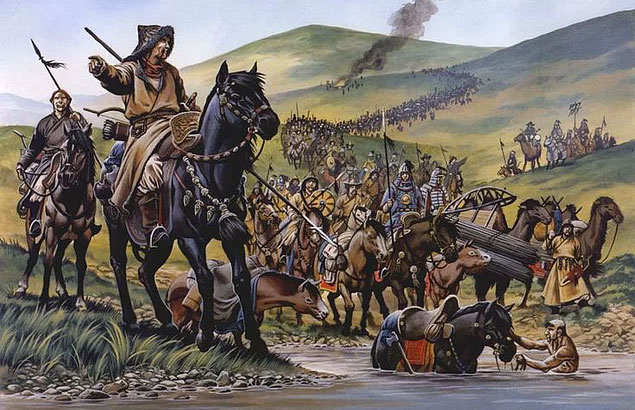Why is the Mongol empire small but occupies the whole world?
Although there were only about 2 million inhabitants at its peak, the Mongol empire defeated its larger enemies , whose culture was considered more advanced to become the largest continuous empire in history.
In human history, Mongolia is regarded by historians as a rare case of a small population empire, located at the outskirts of major civilizations but has conquered a very large part of the world.
The history of the Mongolian empire with the name Thiet Moc Chan , the leader of the title Genghis Khan in 1206. Under Genghis Khan, the Mongols began to expand their territory by annexing each part of Chinese territory.

The population is only 2 million, but Mongolia can defeat the larger enemies.
The big turning point for the Mongol empire was when their envoys were killed by the authorities of the Khwarazmian empire (including Iran, Afghanistan, and Central Asia today). Mongolia's revenge completely destroyed Central Asia, ending the golden era of this region.
In the following period, the Mongols conquered most of the Middle East, Eastern Europe and China. They only encountered a number of defeats considered small compared to the size of the entire empire, including unsuccessful invasions in Japan, Egypt and Dai Viet.
Although there were only about 2 million people at its peak, Mongolia defeated its larger enemies, whose culture was considered more advanced to become the largest continuous empire in history. world. Why can they do this?
According to historians, despite the small population, the Mongols were able to launch large and mobile armies because they carried cattle herds and maintained the power of soldiers with horse meat . Because of logistics constraints, it was difficult for their opponents to launch a matching army.
Though cruel in invasions, the Mongols proved to be wise and tolerant rulers in the lands they occupied. Therefore, they can maintain peace for a long time in the occupied area, creating a basis for continuing to invade new territories.
In the long run, though, the Mongols proved ineffective in managing their large empire. And they do not have a culture strong enough to avoid being integrated into indigenous cultures.
Eventually, the Mongol empire was split into four kingdoms, after which each of these kingdoms disintegrated or became smaller, gradually disappearing in history.
- Tiny animals banish the Mongolian army, save Europe from destruction?
- The longest, most powerful empires in world history
- 10 little things to know about the notorious Mongol leader Genghis Khan
- Climate change prevents the Genghis Khan village from conquering the Southern Song
- The reason Mongolia became the greatest empire in history
- Dai Viet's power is seen from the best of Nguyen Mong Emperor
- 'Typhoon' defeated the invasion of the Mongolian empire
- The most powerful Empire ever defeated the Roman Empire and ended after 'bullying' Russia
- 8 most bloody casualties of human history
- Learn 4 Iraq's mighty empire
- Shocking revelations about the mighty warrior of Genghis Khan
- The mysterious screen about the burial place of Genghis Khan
 'Fine laughs' - Scary and painful torture in ancient times
'Fine laughs' - Scary and painful torture in ancient times The sequence of numbers 142857 of the Egyptian pyramids is known as the strangest number in the world - Why?
The sequence of numbers 142857 of the Egyptian pyramids is known as the strangest number in the world - Why? History of the iron
History of the iron What is alum?
What is alum?